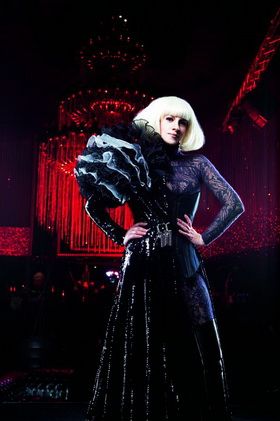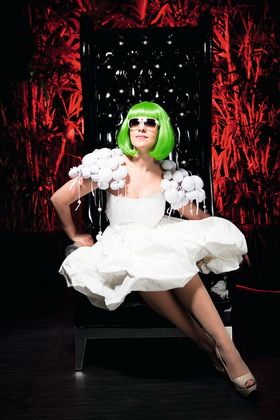.
This is the 4th and last part of the interview published in TABU magazine. Hope you liked it.
.
.
.
What I didn't know back then was that her care for details and for the members of the crew was as famous as her voice. The machinists at La Scala in Milan gave her gifts when she came back for a new production. They were happy to see her again. But Angela's secret is in fact the careful preparation before any project she gets involved in: filming a TV show, a photo shooting, an interview and especially the rehearsals for performances. She does her homework at home. She always  practices by herself, no teacher, no pianist.
practices by herself, no teacher, no pianist.
.
 practices by herself, no teacher, no pianist.
practices by herself, no teacher, no pianist..
Her work is a private thing she cherishes a lot. Not even her husband and partner in many operas, Roberto Alagna, whom she separated from for a while, has never seen her practice.
.
"I go to Switzerland where I have a home and practice by myself. When I take I part I start practicing like in school. I read the notes. I sing the notes. After I finish, I read the libretto like a novel. I sing in Italian and French, two languages that I speak and understand very well. After that I start practicing the most difficult moments and arias. My inner hearing works perfectly and I practice. Again and again. I care about the long musical phrases; I try to exercise my diaphragm. And many times I even play. I think that for that scene the director might want something in particular. I lie down and sing in the most difficult positions. Most of the times the directors don't ask what I prepared at home in order to be able to sing a certain phrase in the most unusual circumstances. But I do this for me, to know that I can do it. Many times I disappointed that directors don't try more things because they imagine I wouldn't do it. I would like them to challenge me more.
.
.
"I go to Switzerland where I have a home and practice by myself. When I take I part I start practicing like in school. I read the notes. I sing the notes. After I finish, I read the libretto like a novel. I sing in Italian and French, two languages that I speak and understand very well. After that I start practicing the most difficult moments and arias. My inner hearing works perfectly and I practice. Again and again. I care about the long musical phrases; I try to exercise my diaphragm. And many times I even play. I think that for that scene the director might want something in particular. I lie down and sing in the most difficult positions. Most of the times the directors don't ask what I prepared at home in order to be able to sing a certain phrase in the most unusual circumstances. But I do this for me, to know that I can do it. Many times I disappointed that directors don't try more things because they imagine I wouldn't do it. I would like them to challenge me more.
.
The true Angela is when I'm alone on stage and nobody in the world can help me. When nobody can give or take. It's just me with myself, with God, with all I've ever learnt. And I take this crucial exam every evening. You shouldn't think I'm not nervous. At 18 when I did those shows "Do you like opera" I had some attacks because of the emotions. But something magical happens on stage, something I don't want to explain and there's no explanation to give. You have to feel it. If I'm an artist, I have to understand some things that come with it: the journalists, the paparazzi, everything. When you got that you're a sort of showman and come in front of people, in a certain way you belong to them. So you don't have to complain. God takes care of everything. The real me, with good and bad, is the one on the stage”.
.
On our third meeting, in an elegant bar of a hotel downtown Bucharest, I asked her if and when she cries. “Of course I cry. It’s good to cry. The person who knows to cry is happy. The persons who don’t cry are awful. If they don’t free the sadness they gather frustrations and this is not good”
.
She was wearing a two piece suite whose skirt allowed a glance to her legs, well outlined by the long, black boots. Above the brilliance of the moment I was about to discover a new side of Angela Gheorghiu. “You never hesitate to say you’re Romanian” I provoked her. “You do you, journalists, always see the matter from this angle? Why shouldn’t I say it if it’s the true? I ask them to write that I’m from Adjud, Romania, not just the country. Wouldn’t I get the same respect if I was born in a small village in USA?” she talked back clenching the right hand.
.
So that’s why you always include a Romanian song in your concerts. “Nobody can give or take anything. For me, the Romanian music is the ultimate emotion. It’s like scanning a person; it’s the pure me. If a Russian sings in Russian he or she will be more persuasive than singing in French. Even if he or she speaks French perfectly. It’s the same with me. The Romanian music reaches my deepest feelings. And there’s more”. The fingers of the ri ght hand clenched again and the palm turned into a fist vibrated with steadiness. “Those who go to the European Parliament should invite the ministers of education from all over Europe to include in the curriculum a chapter about the culture of Easter Europe countries. I learnt in school about Baudelaire, Goethe, Shakespeare, about Russians and Polish, they should study about us. This is one of the reasons I sing in Romanian. I watch the audience and I feel like saying – Gentlemen, it’s not your fault that you never heard of Eminescu, Paul Constantinescu, Enescu. If I’m here in front of you you’ll learn about them whether you want it or not”. I can do this using the music. And people understand that even if they don’t know the great Romanian artists, it doesn’t mean they are less important”
ght hand clenched again and the palm turned into a fist vibrated with steadiness. “Those who go to the European Parliament should invite the ministers of education from all over Europe to include in the curriculum a chapter about the culture of Easter Europe countries. I learnt in school about Baudelaire, Goethe, Shakespeare, about Russians and Polish, they should study about us. This is one of the reasons I sing in Romanian. I watch the audience and I feel like saying – Gentlemen, it’s not your fault that you never heard of Eminescu, Paul Constantinescu, Enescu. If I’m here in front of you you’ll learn about them whether you want it or not”. I can do this using the music. And people understand that even if they don’t know the great Romanian artists, it doesn’t mean they are less important”
.
She really meant that while her palm was still clenched. It’s her favorite gesture. She does it in every decisional moment. It’s the gesture of a woman that has been taking the professional or personal decisions by herself for years.
.
Looking at her fist and remembering the moments she led the team during the photo shoot and made my colleagues smile I realized one thing. She’s like a magnet. When she talks to you, you don’t hear anything, as if nothing and nobody existed around you. There’s only Angela Gheorghiu.
.
On our third meeting, in an elegant bar of a hotel downtown Bucharest, I asked her if and when she cries. “Of course I cry. It’s good to cry. The person who knows to cry is happy. The persons who don’t cry are awful. If they don’t free the sadness they gather frustrations and this is not good”
.
She was wearing a two piece suite whose skirt allowed a glance to her legs, well outlined by the long, black boots. Above the brilliance of the moment I was about to discover a new side of Angela Gheorghiu. “You never hesitate to say you’re Romanian” I provoked her. “You do you, journalists, always see the matter from this angle? Why shouldn’t I say it if it’s the true? I ask them to write that I’m from Adjud, Romania, not just the country. Wouldn’t I get the same respect if I was born in a small village in USA?” she talked back clenching the right hand.
.
So that’s why you always include a Romanian song in your concerts. “Nobody can give or take anything. For me, the Romanian music is the ultimate emotion. It’s like scanning a person; it’s the pure me. If a Russian sings in Russian he or she will be more persuasive than singing in French. Even if he or she speaks French perfectly. It’s the same with me. The Romanian music reaches my deepest feelings. And there’s more”. The fingers of the ri
 ght hand clenched again and the palm turned into a fist vibrated with steadiness. “Those who go to the European Parliament should invite the ministers of education from all over Europe to include in the curriculum a chapter about the culture of Easter Europe countries. I learnt in school about Baudelaire, Goethe, Shakespeare, about Russians and Polish, they should study about us. This is one of the reasons I sing in Romanian. I watch the audience and I feel like saying – Gentlemen, it’s not your fault that you never heard of Eminescu, Paul Constantinescu, Enescu. If I’m here in front of you you’ll learn about them whether you want it or not”. I can do this using the music. And people understand that even if they don’t know the great Romanian artists, it doesn’t mean they are less important”
ght hand clenched again and the palm turned into a fist vibrated with steadiness. “Those who go to the European Parliament should invite the ministers of education from all over Europe to include in the curriculum a chapter about the culture of Easter Europe countries. I learnt in school about Baudelaire, Goethe, Shakespeare, about Russians and Polish, they should study about us. This is one of the reasons I sing in Romanian. I watch the audience and I feel like saying – Gentlemen, it’s not your fault that you never heard of Eminescu, Paul Constantinescu, Enescu. If I’m here in front of you you’ll learn about them whether you want it or not”. I can do this using the music. And people understand that even if they don’t know the great Romanian artists, it doesn’t mean they are less important”.
She really meant that while her palm was still clenched. It’s her favorite gesture. She does it in every decisional moment. It’s the gesture of a woman that has been taking the professional or personal decisions by herself for years.
.
Looking at her fist and remembering the moments she led the team during the photo shoot and made my colleagues smile I realized one thing. She’s like a magnet. When she talks to you, you don’t hear anything, as if nothing and nobody existed around you. There’s only Angela Gheorghiu.
.
0 comments:
Post a Comment